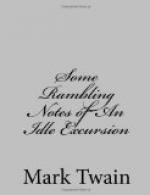The Reverend had been an army chaplain during the war, and while we were hunting for a road that would lead to Hamilton he told a story about two dying soldiers which interested me in spite of my feet. He said that in the Potomac hospitals rough pine coffins were furnished by government, but that it was not always possible to keep up with the demand; so, when a man died, if there was no coffin at hand he was buried without one. One night, late, two soldiers lay dying in a ward. A man came in with a coffin on his shoulder, and stood trying to make up his mind which of these two poor fellows would be likely to need it first. Both of them begged for it with their fading eyes—they were past talking. Then one of them protruded a wasted hand from his blankets and made a feeble beckoning sign with the fingers, to signify, “Be a good fellow; put it under my bed, please.” The man did it, and left. The lucky soldier painfully turned himself in his bed until he faced the other warrior, raised himself partly on his elbow, and began to work up a mysterious expression of some kind in his face. Gradually, irksomely, but surely and steadily, it developed, and at last it took definite form as a pretty successful wink. The sufferer fell back exhausted with his labor, but bathed in glory. Now entered a personal friend of No. 2, the despoiled soldier. No. 2 pleaded with him with eloquent eyes, till presently he understood, and removed the coffin from under No. 1’s bed and put it under No. 2’s. No. 2 indicated his joy, and made some more signs; the friend understood again, and put his arm under No. 2’s shoulders and lifted him partly up. Then the dying hero turned the dim exultation of his eye upon No. 1, and began a slow and labored work with his hands; gradually he lifted one hand up toward his face; it grew weak and dropped back again; once more he made the effort, but failed again. He took a rest; he gathered all the remnant of his strength, and this time he slowly but surely carried his thumb to the side of his nose, spread the gaunt fingers wide in triumph, and dropped back dead. That picture sticks by me yet. The “situation” is unique.




